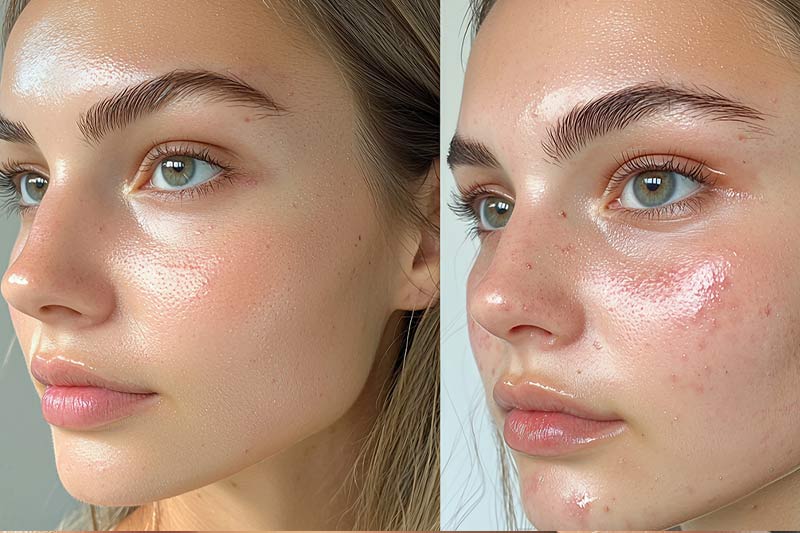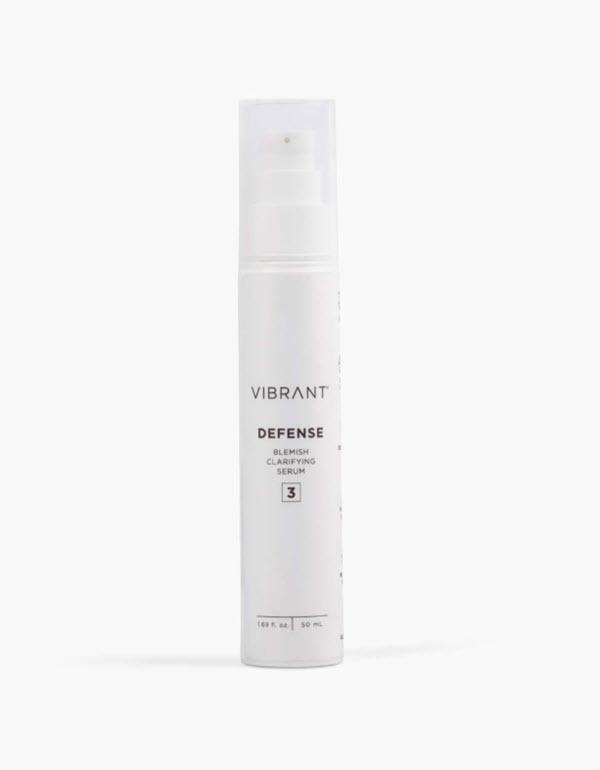Vitamin A is an essential nutrient that supports vision, reproductive function, immune system, and skin health. Its potent antioxidant properties help reduce acne, wrinkles, and dark spots. Deficiency can worsen conditions like acne, dryness, and eczema.
This article explains how vitamin A promotes skin health and teaches practical ways to incorporate it into your daily routine.

How Does Vitamin A Deficiency Affect the Skin?
Vitamin A deficiency is not common in areas where nutrient-rich food is readily available. Still, it may affect premature infants, people with cystic fibrosis or liver malfunction, and pregnant women in developing countries.
It affects the skin in the following ways:
- Dry or scaly skin
- Thickened skin
- Itchiness
- Frequent breakouts
- Skin inflammation
- Slow wound healing
- Impaired cell turnover
- Fine lines and wrinkles
- Dull complexion
Vitamin A deficiency is also associated with other health issues, such as vision problems, infertility, delayed growth, and respiratory tract infections.
Types of Vitamin A for Skin Care
Retinoids are the most potent vitamin A-based skincare ingredients. They contain pure retinoic acid and become active immediately upon application. Other forms of vitamin A must first convert to retinoic acid to exert their effects.
Retinoids can be broken down into four main categories:
Retinyl Esters
This is the mildest form of vitamin A, requiring three conversions to become active. It is suitable for sensitive skin and promotes gentle improvements.
Side effects are generally minimal but may include mild irritation.
Retinol
Retinol is a mild vitamin A derivative suitable for gentle cosmetic improvements. It is active after two conversions and is safe when used at a maximum of 0.3 % in face creams, hand creams, and rinse-off products, or 0.05 % in body lotions.
Retinol remains on the skin’s surface and does not penetrate deeper. It may initially cause irritation, over-exfoliation (peeling), redness, and sun sensitivity, compromising the barrier and increasing water loss.
While retinols do stimulate collagen production, they do so as a response to the micro-wounds created by their exfoliating action. This means that continuous use may cause the skin to become thinner in the dermal layer.
Retinaldehyde (Retinal)
Retinal is the strongest over-the-counter retinoid, becoming active on the skin after one conversion. It is the most bioavailable form of vitamin A and is a thousand times more effective at stimulating collagen production than retinol. Clinical studies show it outperforms retinoic acid in promoting long-term collagen production.
Its smaller molecular size means it can penetrate deeper skin layers and help shrink pores, prevent clogging, and minimize aging skin signs without causing sun sensitivity. Retinal is the only retinoid with proven antibacterial properties. It may cause mild irritation when first introduced.
Retinoic Acid
Retinoic acid is the most potent form of vitamin A as it is immediately active upon application. Since the skin is retinoid-responsive, it can efficiently absorb and utilize topical vitamin A. It is highly effective for various skin concerns, including acne, wrinkles, and hyperpigmentation.
Retinoids contain pure retinoic acid and are available only on prescription. They may cause dryness, irritation, and increased sun sensitivity.
Note: Learn how retinol and retinoids differ and ways to incorporate them into your skincare routine.
Vitamin A Skin Care Benefits
Vitamin A offers numerous benefits and helps rejuvenate the skin, brighten the complexion, and clear up blemishes.
Vitamin A for Skin Tightening
Vitamin A improves skin elasticity, prevents premature aging, and rejuvenates the skin by stimulating collagen, removing damaged elastin fibers, and promoting the formation of new blood vessels.
It helps improve skin texture and reduce fine lines, wrinkles, and acne scars.
Vitamin A for Skin Lightening
Vitamin A-based skincare products enhance skin tone by promoting cell turnover and mild exfoliation. They help minimize hyperpigmentation, such as melasma, age spots, and dark undereye circles.
Vitamin A for Reducing Acne

Retinoids help treat acne and prevent breakouts by unclogging pores, reducing sebum, and removing dirt and dead skin cells. They also minimize the appearance of different types of acne scars by gently exfoliating the skin’s surface and increasing collagen production.
Vitamin A for Minimizing UV Damage
Beta-carotene (the natural form of vitamin A) is a potent antioxidant that increases the skin’s resilience against UV radiation, prevents cell damage, and protects against environmental factors such as air pollution.
Its photoprotective properties reduce sun damage and prevent photoaging, wrinkle formation, and discoloration.
Note: Learn more about skin pollution and anti-pollution skincare products.
Vitamin A for Treating Psoriasis
Topical retinoids and vitamin A-based oral prescription medications alleviate symptoms of psoriasis, including thickness, rashes, itchiness, and dryness.
Topical products and retinoid drugs such as acitretin play a role in regulating the production of skin cells and reducing inflammation, redness, discomfort, and the formation of raised skin patches.
How to Use Vitamin A in Skin Care?
You can optimize vitamin A levels through food, supplements, skincare products, or prescribed retinoid drugs. Consult your dermatologist before adding new supplements or products to your routine.
Food
A healthy, balanced diet is the cornerstone of skin health. The recommended daily intake of vitamin A is 900 micrograms (mcg) for men and 700 mcg for women.
Incorporate more vitamin A-rich foods into your diet, such as the following:
- Leafy green vegetables
- Sweet potatoes
- Carrots
- Tomatoes
- Mangoes
- Apricots
- Plums
- Salmon
- Shrimp
- Beef liver
- Eggs
- Cod liver oil
- Dairy products
- Fortified cereals
Supplements
Dietary supplements also help prevent vitamin A deficiency and restore a healthy glow to your skin. Your healthcare provider will help you choose the most appropriate supplement and adjust the dosage depending on your needs.
Vitamin A supplementation options include:
- Beta-carotene (provitamin A) – Converted to vitamin A in the body.
- Retinyl acetate or retinyl palmitate (preformed vitamin A) – Active forms readily used by the body.
- A combination of preformed and provitamin A – Provides balanced intake.
- Multivitamins or mineral supplements – Often include vitamin A as part of a broader nutrient profile.
Topical Retinoids
Topical retinoids are vitamin A derivatives widely recognized for their ability to improve skin texture, treat acne, and reduce signs of aging. Available in both over-the-counter and prescription formulations, they work by accelerating cell turnover, unclogging pores, and stimulating collagen production.
Over-the-counter options, such as retinol and retinal, are milder and ideal for beginners or those with sensitive skin. Prescription-strength retinoids, including tretinoin and tazarotene, offer more potent results for persistent acne, wrinkles, and hyperpigmentation but may require careful application to minimize irritation.
Over-the-Counter Retinoids
Retinol serums and creams provide the skin with potent moisturizing agents, prevent wrinkle formation, and clear acne. They promote the shedding of old skin cells and stimulate the production of new cells, improving both texture and tone.
Serums contain higher retinol concentrations, which penetrate deeper into the skin, deliver fast results, and are more suitable for oily, acne-prone skin. Creams are a better choice for dry and sensitive skin types.
Excellent anti-aging retinal creams and serums for wrinkles, sagging skin, or discoloration include Isdin Retinal Advanced and Osmosis Correct MD Preventative Retinal Serum.
We recommend Vibrant Defense, a blemish-clarifying serum with retinal and bakuchiol, a plant-based ingredient known for its anti-inflammatory, antibacterial, and antioxidant properties. Bakuchiol is a natural retinol alternative that aids in the penetration of retinaldehyde, ensuring deeper delivery of its effects. This serum stimulates collagen production and cellular turnover, minimizes the appearance of pores, and heals scar tissue.

Prescription Retinoids
Prescription topical retinoids are potent vitamin A derivatives used to treat various skin concerns, including acne, signs of aging, hyperpigmentation, and psoriasis. Unlike over-the-counter retinol products, prescription retinoids contain retinoic acid or its stronger derivatives, which work directly on the skin without requiring conversion. These products can cause dryness, peeling, and irritation, especially during initial use, so gradual application and sunscreen are recommended.
Common prescription topical retinoids include:
- Tretinoin (Retin-A, Renova, Avita) – Treats acne, fine lines, and discoloration by promoting cell turnover and collagen production. Side effects include redness, peeling, and dryness.
- Adapalene (Differin, now also available OTC) – Initially prescription-only, it is still prescribed for stronger formulations to combat acne with fewer side effects than tretinoin. It may cause dryness.
- Tazarotene (Tazorac, Fabior) – A stronger retinoid used for acne, psoriasis, and signs of photoaging, often requiring careful monitoring for irritation.
- Trifarotene (Aklief) – A newer retinoid designed specifically for acne treatment, targeting both facial and body breakouts with improved tolerability.
Prescription Retinoid Drugs
Prescription oral vitamin A medications treat moderate to severe acne, psoriasis, hand dermatitis, and other inflammatory skin conditions. They include the following:
- Acitretin (Neotigason™, Novatretin®) – Side effects include dry skin, hair loss, and potential liver issues.
- Alitretinoin (Toctino®) - Side effects include dry skin, hair loss, liver issues, and headaches.
- Bexarotene (Targretin®) – It may cause hyperlipidemia and skin irritation.
- Isotretinoin (Accutane®, Roaccutane®) – Common side effects include dry skin, chapped lips, nosebleeds, temporary hair thinning, muscle and joint pain, fatigue, and night blindness.
- Vitamin A (retinol) – May lead to increased photosensitivity, dryness, and irritation.
When to Use Vitamin A in Skin Care?
Gradually introduce topical vitamin A products into your routine, starting with one to two applications per week. The best time to apply vitamin A is at night, as it may increase sun sensitivity.
Can I Use Vitamin A for Skin Care Every Day?
You can use vitamin A daily if your skin shows no signs of irritation. Bear in mind that retinol products are gradually added to the skincare routine to avoid irritation. Dermatologists advise beginning with one or two applications per week, gradually increasing the frequency to every night or every other night.
Can Vitamin A Cause Skin Damage?
Consuming too much vitamin A orally or topically can provoke toxicity or hypervitaminosis A, leading to these skin issues:
- Dry skin
- Redness
- Itching
- Scaling
- Rough texture
- Cracked lips
- Skin peeling
- Eczema flare-ups
- Increased sensitivity to UV light
High beta-carotene intake can temporarily turn your skin yellow-orange, but this harmless side effect disappears once you lower the consumption.
High intakes of preformed vitamin A in supplements and medications can be harmful and cause severe health issues, such as blurred vision, nausea, muscle aches, headaches, liver malfunction, and problems with coordination.
Topical retinol can be very drying and irritating, leading to redness, flakiness, and peeling, especially for those with sensitive skin. It increases skin sensitivity to sunlight, raising the risk of UV damage and DNA mutations. With prolonged use, retinol can compromise the skin's barrier, leading to increased water loss and greater vulnerability to external irritants.
Topical retinoids may worsen the following skin conditions:
- Hormonal acne
- Skin allergies
- Rosacea
- Eczema
- Acne scarring
- Dry skin
For this reason, it is essential to consult an expert on what form and concentration of vitamin A to introduce to your skincare regimen.
Can Too Much Vitamin A Cause Acne?
Excess vitamin A does not cause acne. However, over-supplementation may worsen skin inflammation, leading to more irritation, redness, and flare-ups.
Can I Combine Vitamin A for Skin Care with Other Ingredients?
You can combine retinol with hyaluronic, linoleic, and oleic acid to preserve moisture, mitigate retinol’s drying effects, and achieve a glowing complexion.
Benzoyl peroxide and acidic skincare ingredients like vitamin C, alpha hydroxy acids (AHAs), and beta hydroxy acids (BHAs) do not pair well with retinol and retinoids as they may cause redness, peeling, and skin irritation.
Avoid mixing retinol with the following ingredients:
- Glycolic acid
- Lactic acid
- Mandelic acid
- Citric acid
- Salicylic acid
- Ascorbic acid (vitamin C)
Consult your dermatologist before adding any of these ingredients to your routine. You can use them on separate days or during your morning or night skincare routine.
Oral and topical vitamin A can also interact with the following supplements and medications:
- Acitretin (Soriatane) – Used to treat severe skin conditions like psoriasis.
- Bexarotene (Targretin) – A cancer treatment for cutaneous T cell lymphomas.
- Orlistat (Alli, Xenical) – A weight-loss medication.
Conclusion
Vitamin A is crucial for skin health and can be obtained through food, supplements, medications, and topical products. Renowned for its rejuvenating and acne-fighting effects, retinol has become the mainstay in the beauty industry and an essential component of many skincare products.
Consult Vibrant Skin Bar skincare experts to learn more about brightening your complexion, tightening your skin, or reducing acne with retinol-based skincare.


